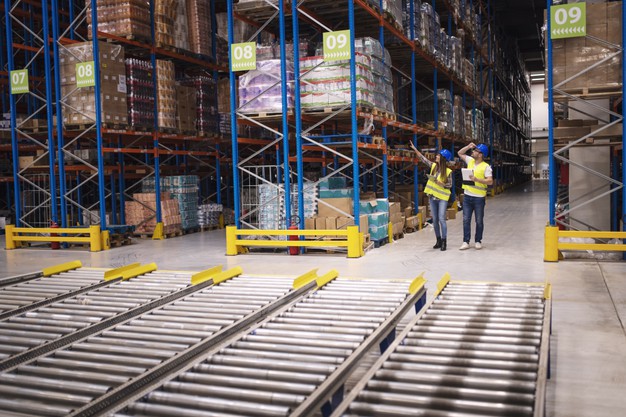Logistics and Supply Chain Management
In this blog, we will be talking about and understanding the difference between logistics and supply chain management. We will also discuss the important role of logistics in supply chain management that includes many suppliers, transit points, as well as points of departure and destination.
What Is Supply Chain Management?
The process of logistics and supply chain management is one of the crucial processes every organization depends upon for its smooth functioning. Both logistics and supply chain management go hand-in-hand.
Supply chain management includes functions involved in receiving and fulfilling a customer’s requirement. These functions constitute new product development, marketing, operations, distribution, finance, and customer service.
The distributor provides information and sends delivery schedules to the retailers. Similar information and funds will flow across the entire supply chain.
The customer is an integral part of the supply chain. The primary reason behind fulfilling any customer needs is the process of generating profit for itself. The entire management begins with a customer order and ends when the customer has paid for his or her purchase.
The image of a product or supply moving from supplier to manufacturer, to distributor to the retailer to the customer along a chain, is what we include while defining the term supply chain, along with taking into consideration information funds, product flow, and directions of the chain. Only one player is involved at every stage of the supply chain process. But, the reality is the manufacturer receives material from several suppliers and supply it to several distributors.
A real supply chain involves different stages:
STAGES INCLUDE:
- Customers.
- Retailers.
ADVERTISEMENTS:
- The wholesalers/Distributors.
- The manufacturers.
- The suppliers of raw material

What Is Logistics?
Supply chain management professionals define logistics as, “part of the supply chain process that plans, implements and controls the efficient, effective forward and reverses flow and storage of goods, services and related information between the point of origin and the point of consumption in order to meet customer’s requirements”.
The idea behind logistics is to make sure customers receive products – services at the right time and place with the right quality.
The logistic management system is divided into two categories:
Inbound logistics: Inbound logistics covers activities concerned with obtaining the materials and handling, storing, and transporting them. Activities that cover and are concerned with obtaining the materials and maintenance, and the distribution to the customers, collection, maintenance, as well distribution to the customers, packing and fulfilling orders, warehousing managing stock, and maintaining the warehouse.
Outbound logistics: Activities with the collection, maintenance, and distribution to the customer. Other activities in this category include packing and fulfilling orders, warehousing, managing stock, and maintaining the balance between supply and demand also factor into logistics.
Key Difference Between Logistics and Supply Chain Management
It is important to remember that, terms should be used interchangeably and they should supplement each other.
Some more differences between logistics and supply chain management that will help to gain better clarity slowly blurring the lines in between.
Supply chain management will be used to link to major business units, within cross companies into a high-performance model which drives into a competitive advantage.
The major differences isTthe main focus of the supply chain is a competitive advantage, while the primary focus of logistics is fulfilling the customer requirements.
The movement, storage, and flow of goods, services, and information inside and outside the organization are called logistics. It has been often attached with terms like podcasts, emerging from its military roots while supply chain management is a relatively new term. The important point here that needs to remember is that logistics is a part of the supply chain.

How Does Inventory Play a Crucial Role In Supply Chain Management And Logistics?
One of the critical aspects of managing the supply chain is managing customer and vendor relationships. However, a closer view of the supply chain relationships, that involves product flows, reveals that at the crux of it, inventory management and storage play a very pivotal role.
Most of the activities that are involved in managing relationships are based on the purchase, transfer, or management of inventory. As such, the role of inventory is very crucial in the process of the supply chain as a salient focus of the supply chain.
Strategic Planning Of Inventory Management In The Logistics Industry
A proper strategic plan can well optimize the entire outlook of the procedure and workflows that are included in the process of inventory and stock management. The best results are achieved by a digital and centralized solution, which gives access to every data and report in real-time from anywhere in the world with the data connection.
As part of the supply chain, the logistics inventory management includes various aspects as controls and supervision of the purchase from the customer, maintenance of stock storage, command on the product sale, and order fulfillment.

3 Core Steps Of Inventory Management In Logistics
1. Purchasing Inventory
Consumable raw materials are delivered to the warehouse for operational acquisition only after it is purchased from the vendor.
2. Stock Storage Of Inventory
The raw materials are transferred to the production site and when finished goods are produced, they are returned to the warehouses till they are shipped out for delivery. Inventory is kept in stock till the time it is needed for production. Profits from inventory – The amount of finished goods that are ready for sale is controlled and cross-checked for order fulfillment before they are shipped to the customers.
3. Profits From Inventory
Finished goods are ready for sale are controlled and cross-checked for order fulfillment before they are shipped to the customers.
Conclusion on Logistics and Supply Chain Management
Logistics and supply chain management should never confused. Logistics is a rather narrowly focused concept, whereas supply chain management is a very complex concept. It involves logistics and performs end-to-end enterprise, in the meantime work with counterparties.
Efficient logistics management aims to achieve maximum competitive advantage and profitability of the company, as well as the entire network structure of supply chains, including the end-user.
In this regard, the integration and introduction of innovations into the processes of supply chains, and logistics, should be aimed at increasing the overall productivity of all their participants. The integration and the introduction of innovation in the process of supply chain and logistics focuses on increasing the overall productivity of all their participants.
Logistics and supply chain management are inseparable concepts improving the overall impression of the level of service for your target audience, helping to reduce the company’s overall costs for the production of goods and/or services. The choice of the right software has a significant role in optimizing logistic tasks.
After all, automation is the head of the progress for industrial enterprises.
 Start using ZapInventory today
Start using ZapInventory today
